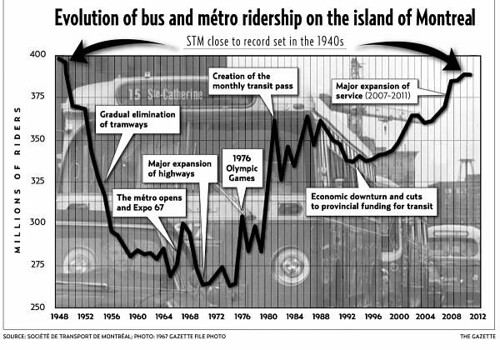GGW has an entry, "
Montreal shows the way for Metro Forward," about the transit expansion planning process in Montreal.
1. Note that while I don't think the transit expansion planning process in Montreal is any better than say in St. Louis or Chicago (see the past blog entry "
St. Louis regional transit planning process as a model for what needs to be done in the DC Metropolitan region") this graphic from the
Montreal Gazette is interesting in how it links ridership decline to the elimination of streetcars and the rise in ridership as a response to transit expansion and improvement, specifically the creation of the Metro subway system and then expansion of bus and subway service more generally--including the creation of transit passes.
I guess I didn't. But it's interesting, but completely not surprising, that by comparison suburban Maryland and Virginia business organizations are pushing a road-based transportation agenda over an integrated transportation and land use planning paradigm focused on transit. See "
Business groups target traffic congestion " from the
Post.
The contrast in the scope and quality of the reports between the respective groups is striking. The Montreal report is far better.
The suburban Washington group justifies their more limited scope because of they defined the primary purpose of the study, to focus on what they call as necessary (road) projects to reduce (road) congestion.
But in fact it is a real failure of planning, of vision, and of understanding how mobility works.
3. The other difference in Montreal is that there is regional transit planning in that certain services are provided for by railroad, especially longer distance services, while within Montreal subway, tram (light rail), and bus planning is managed at a different level. (The other cities in the region plan as well, and Laval and Longeuil get some subway service from STM and they are looking to expand subway service currently.)
In our region there really isn't true transportation planning at the metropolitan scale. Many of the proposals by WMATA in the Metro Forward process are best effectuated by passenger railroad service.
But rather than engage in a true metropolitan-wide transit planning process that includes local transit agencies and the Maryland and Virginia railroad passenger services, WMATA is going it alone.
By being both railroad service for the farther out communities and a true transit utility in closer in locations in the DC core and in Arlington's Rosslyn-Ballston corridor, it's difficult for WMATA to satisfice its different constituencies.
Labels: transportation planning




0 Comments:
Post a Comment
<< Home